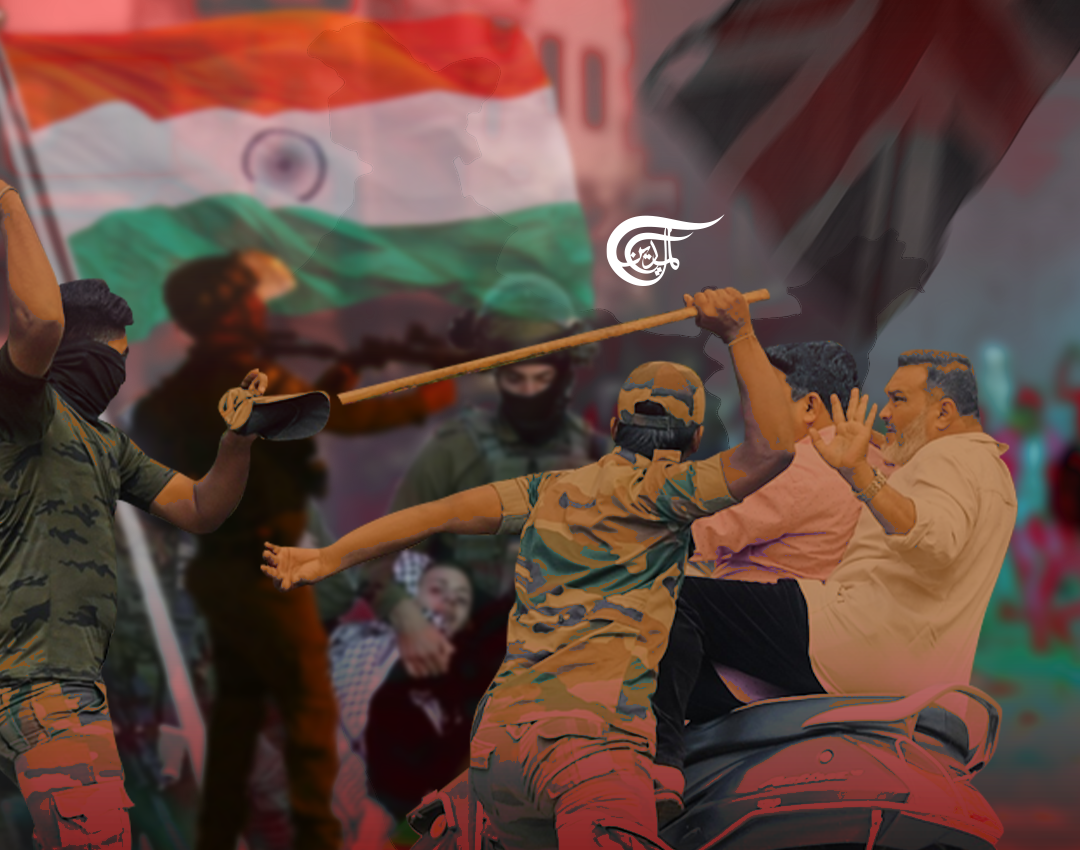Militarist Democracies
We are increasingly witnessing that democracies, or those that claim to be democracies, use their armed forces on their own citizens to enforce their will.
-

Militarist democracies
'Democracy of my conception is wholly inconsistent with the use of physical force for enforcing its will.' - M. K. Gandhi. The Diary of Mahadev Desai: p. 982.
More and more we see that democracies, or those that claim to be democracies, use their armed forces on their own citizens to enforce their will. India, one of the most populous democracies, has been using its armed forces to quell dissent internally for a long time. This is a shame, for a nation that, till recently, proudly proclaimed to the world how it had fought and gained independence utilizing the unique weapon of nonviolence.
Since independence, India has become addicted to utilizing its army to quell violent dissent and, in many cases, its own citizens fighting for a separate identity or for their democratic rights, and this practice has created many shameful episodes.
Recently, on 4th December, one occurred in Nagaland, a state in the North-Eastern region. A Special Forces Unit of the Indian Army was conducting an operation against 'Separatist Militants'. They intercepted a vehicle and killed 6 passengers. They turned out to be civilians, mineworkers going back home after work. It is alleged that the soldiers tried to cover up the encounter. When news of the killings became known, there was grief and anger, and in the violence that ensued, 1 soldier and 7 civilians were killed, a grave tragedy caused by a shameful error. The Union Home Minister has expressed regret and the Government of India has formed a Special Investigation Team to probe the incident and report. But at the root of this latest tragedy is an act of the Indian Parliament, the Armed Forces Special Powers Act, AFSPA as it is known.
Nagaland has had a long-running movement, which is termed by India as separatist, but the people of Nagaland consider it a fight for freedom. Almost the entire North Eastern Region of India since pre-British times was a land of several tribes. Various tribes controlled and governed territories. They lived in that manner for centuries. When the British annexed territories to create their colony in India, they left the tribes alone. But these territories were loosely considered to be a part of British India. When India became independent, these tribal territories were assumed to be a part of India. Many of the tribes to date refuse to accept this and have been fighting for autonomy or some for freedom ever since. The Naga Tribal areas were initially considered to be a part of the state of Assam. The Naga people never accepted it.
The Indian Parliament passed an act in 1958 giving special powers to its armed forces to act against its own citizens to quell unrest. It was specifically applied to what was then called the Naga Hills, a part of the state of Assam. This act known as AFSPA gave special powers to the armed forces to act in areas, districts, or states which were classified as disturbed areas, and the powers were similar to Martial Law. Under this law, the armed forces got absolute powers to act in a manner they deemed fit and to respond in whichever manner they felt was appropriate to quell the disturbances. The act also gave the armed forces immunity from civilian prosecution or the laws of the land. The Disturbed Areas Act, another law enacted by the Parliament, under which the AFSPA is imposed, has to be renewed every 3 months, and so it implies that the AFSPA also once imposed must be repealed after 3 months or renewed. In the North-Eastern states, it has been in force since 1958, when it was first imposed. Today, the AFSPA is in force in Assam, Nagaland, Manipur, three districts of Arunachal Pradesh, Changlang, Longding, and Tirap. In 1990, AFSPA was imposed on the state of Jammu and Kashmir too, where it is still in force. In 1983, AFSPA was imposed on Punjab and Chandigarh too, but it was repealed in 1990.
Sharmila Irom went on a hunger strike to protest against AFSPA. She was arrested but continued the strike for 16 long years, a prolonged protest where she refused nourishment and was force-fed. It was triggered by a similar massacre of civilians by the Indian armed forces, in the Malom Makha Leikai area near Imphal's Tulihal Airport in November 2000. Imphal is the capital city of the state of Manipur. 10 civilians were killed then. There have been many accusations of rape and torture against the armed forces, but they have been shielded from prosecution by the provisions of AFSPA. On July 15, 2004, 12 Manipuri women were stripped naked in front of the headquarters of the Assam Rifles Regiment, to protest against the murder of Manorama Thangjam, who they alleged was repeatedly raped before she was killed by soldiers. The organization 'Mothers of Manipur' continues to protest against AFSPA and the authoritarian actions of the Indian armed forces.
The recent killings in Nagaland have reignited the protest against the prolonged imposition of AFSPA in India. Two Chief Ministers of North-Eastern states have also called for its repeal. Many human rights activists have called for the act to be abolished. It must go.
It is ironic that democratic India has chosen to use its military to subjugate its own people. In colonial times, India and Indians have paid a terrible price because of brutal actions against their people by the armies of the colonial power. After the 'Mutiny' of 1857 failed, the army of the British East India Company unleashed a reign of terror to suppress the uprising and subjugate the people. When the British Crown took over, they continued the practice. The most vicious and brutal examples were in their oppression of Punjab where Martial law was imposed to quell civil disobedience and a few incidents of violent acts against the colonial administration. Under Martial Law, Indians, in general, and citizens of Amritsar, in particular, were subjected to unimaginable brutality. The colonial administration promulgated an order that in a particular lane in Amritsar, Indians must crawl on their bellies. To impose this law, they positioned armed police at both ends of the lane. Indians entering that lane were forced to crawl on their bellies across the entire length of the lane. A policeman would walk along with the crawling Indians to push them down, by standing on their backs, to ensure that they dragged their entire bodies on the road. Indians were not even allowed to lift up their heads. If anyone disobeyed, they were stripped and flogged and even shot as per the whim of the policemen. Men, women, and children, no one was spared. Such barbarity was officially practiced by a country that prides itself to be a civilized democracy.
The epitome of British barbarity occurred in Amritsar on April 13, 1919. Citizens gathered on a ground in central Amritsar, which was surrounded by walls and accessible only through a narrow lane. The meeting was a peaceful protest against the Rowlatt Act and the brutal Martial Law. The Lieutenant Governor of Punjab Michael Francis O'Dwyer wanted to teach the citizens a lesson. He authorized the Acting Brigadier-General Reginald Dyer with absolute powers to do what it took to maintain order. Dyer marched into the ground, sealed off the only entry and exit lane, and ordered his men to aim at the people and fire to kill. Officially 379 people were listed as having been killed and 1200 injured in the firing. Other sources have claimed that the figure of those killed was over a thousand and that of the injured was never accurately confirmed. Throughout their occupation of India, the British acted very brutally to subjugate Indians, the Jallianwala Bagh massacre has become the icon of British brutality. After an outcry against the massacre, the colonial administration appointed an inquiry commission, but it was an eyewash; both O'Dwyer and Dyer were eulogized and feted as heroes in England. The British Government has officially never apologized to the Indian people for their brutality to date. But then they were an alien power who had enslaved us and so they did not consider us humans. Unfortunately, since Independence, governments of 'democratic' India have employed similar policies to subjugate their own citizens. AFSPA is only one example.
Readers might wonder why I write about what primarily is an internal matter of India. I write about this because subjugation and oppression by armed forces is nothing new for Palestinians; it has become a daily ordeal for them. The occupier state of "Israel" has used its armed forces to brutally subjugate and oppress Palestinians in their own homeland. They will be able to empathize with the plight of Indian citizens who are also suffering from oppression by their own state and by their own armed forces, who should be ensuring their safety.

 Tushar Gandhi
Tushar Gandhi
 9 Min Read
9 Min Read











